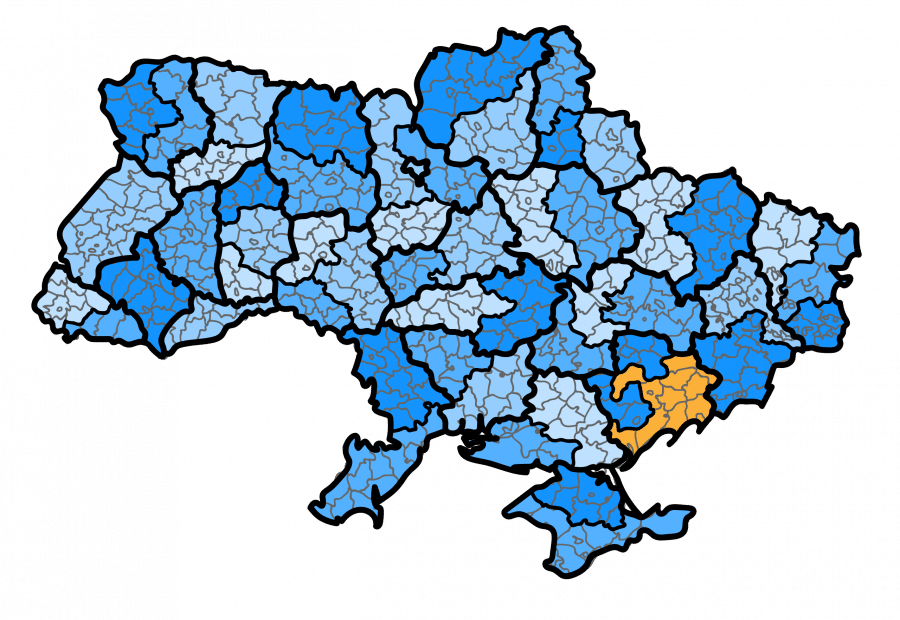The Berdyansk diocese of the UOC, located in the Russian-occupied Zaporozhye region, was taken away from the Ukrainian Orthodox Church by an official decision of the Synod of the Moscow Patriarchate. The decision states “to accept the Berdyan Diocese in direct canonical and administrative subordination to the Patriarch of Moscow and All Russia.” This happened on May 16, when a new ruling bishop was appointed, Bishop Luka of Bronitsa, vicar of Patriarch Kirill of Moscow.
In order to justify the seizure of the diocese and the removal of its Ukrainian metropolitan, a letter-appeal of the local priests of May 1, who pledged their political loyalty to the occupying Russian authorities, was used. They say that they strongly desire to come under direct subordination to the Patriarch of Moscow, as their metropolitan has been unable to care for the diocese and this has led to turmoil in church life. Of the 86 priests, only five did not sign and five were ill.
However, the desire of priests has never been a factor in changing the episcopal jurisdiction of any diocese. Therefore, in the decision of the Russian Synod, “the actual abandonment of the diocese by Metropolitan Ephrem of Berdyan” was used as a reason for the annexation.
However, Metropolitan Ephrem’s last service in the cathedral in Berdyansk was on April 25 for Radonitsa (Easter service for the dead), which shows that the righteous bishop “did not abandon” his diocese, but a canonical pretext was sought. The metropolitan’s sick leave immediately after the holidays was used, which was immediately presented as “abandonment of the diocese”.
The decision is a clear example of ecclesiastical pharisaism, when the canons are used only to give an ecclesiastically acceptable appearance to an injustice that everyone is aware of.
On May 19, Metropolitan Ephrem of Berdyansk and Primorsky from the UOC reacted sharply and placed four priests from the diocese under interdict.
These are the secretary of the Berdyan Diocese, Prot. Sergiy Ilyushchenko and the regional deputy of the Kamian region, Archimandrite Dimitrii (Mikheshkin), for “gross violation of the priest’s oath based on Rule 39 of the Holy Apostles and Rule 57 of the Council of Laodicea.” Father Yevgeny Klimenko and Father Dmytro Lebedchenko, head of the diocesan youth department, were also placed under interdict for “gross violation of the priestly oath based on Rule 39 of the Holy Apostles.”
However, on May 21, the ROC declared the decisions of the Ukrainian metropolitan “invalid”: “With the blessing of the ruler of the Berdyan Diocese, His Eminence Bishop Luka, we announce that by virtue of the decision of St. The Synod of May 16 regarding the management of the Berdyan Diocese, the decrees issued on May 19 of this year by His Eminence Ephrem and subsequent decrees, if any, are considered invalid.”
Berdyansk Diocese was formed by the Ukrainian Orthodox Church in 2007 through the division of the Zaporizhian Diocese into two parts – Zaporizhia and Berdyansk. Since 2012, it has been managed by Metropolitan Efrem.
This is another Ukrainian diocese that broke away from the UOC and joined the Moscow Patriarchate – in this regard, church policy strictly follows the political line of the Russian state, which annexed the occupied territories.
However, this strategy does not prevent Russian church diplomats from presenting themselves internationally as “defenders of the canonical Ukrainian Church.” They have like-minded supporters among the Bulgarian high clergy, who consider these and similar actions to be completely just, pious and in the spirit of the Orthodox faith.











